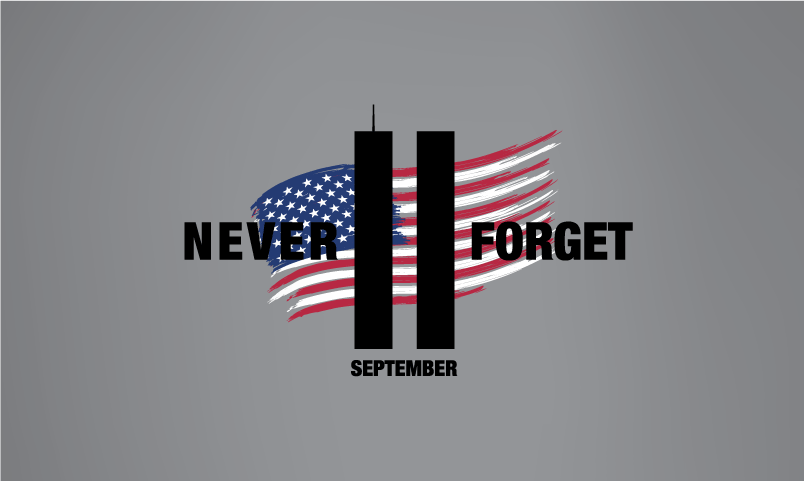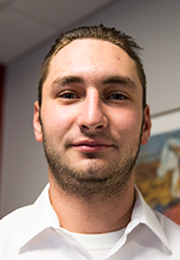16th anniversary of 9/11 is meaningful for SRU security services students

Sept. 11, 2017
SLIPPERY ROCK, Pa. - Sgt. Tyler Wyckoff remembers the day when he was in the second grade: teachers were acting weird, lesson plans were abandoned and students were allowed to talk among themselves. He knew something terrible happened in New York, but when he got home he wondered why his father, who worked on the 39th floor of the U.S. Steel Building in Pittsburgh, was sent home early.
Sixteen years later, Wyckoff, now 23, will sit in a classroom at Slippery Rock University as one of a few college students who still have vivid memories from the day of the terrorist attacks against the United States, Sept. 11, 2001.

Wyckoff
"Professors will ask, 'Where were you?,' 'What were you doing?,'" said Wyckoff, a senior homeland security major from Trafford. "People will ask me, 'How do you remember all that?' It was such a nightmare; how can you not remember something like that?"
Wyckoff enlisted in the U.S. Army Reserves at 17, attended community college and was deployed for eight months in Kandahar, Afghanistan, shortly before enrolling at SRU in 2015. Although he's slightly older than most SRU students, Wyckoff considers the 16th anniversary of 9/11 as something meaningful, not just for him, but also for all Americans.
"No matter when you grew up, if you lived through it or you were born before it, it's still a thing of respect," Wyckoff said. "Other than a day of remembrance, it's a day of respect. It's not like the Fourth of July when you celebrate. You celebrate the lives of those lost, but in an aspect of remembrance and respect."
For students in SRU's security studies program, knowing the severity of 9/11 is important to understanding terrorism and the careers they plan to enter, even if students who are now entering the program were too young to remember 2001.
Susan Lubinski, associate professor of criminology and security services, started teaching a Terrorism Law class at SRU 12 years ago and a Fundamentals of Terrorism course that started two years ago when the security studies program was created. She has her students watch "9/11," a 2002 documentary directed by Jules and Gedeon Naudet and FDNY firefighter James Hanlon before assigning the students a reaction paper.
"The students describe it like an event made for a movie," Lubinski said. "They can't believe it is real, but they understand the importance of it. There has to be that historical piece for the students to understand."
Now in its second year, there are nearly 100 SRU students enrolled in the security studies program, which includes bachelor's degrees in either homeland security or corporate security management.
"The students in the program are phenomenal," Lubinski said. "Not only are they interested in the program, but dedicated to the mission of securing both the private and public sectors."
Lubinski's discussion about the Sept. 11 attacks extends farther than the classroom. On the 16th anniversary, she will visit Shenango High School in New Castle to speak to upperclassmen in six history classes about terrorism and 9/11, and also to conduct a "Career Café" for seventh and eighth graders to teach them about careers in homeland security and corporate security.
The demand for professionals in the security industry has continued to accelerate since 9/11. The FBI employs nearly 13,000 special agents, a third of which Lubinski estimates work in counter-terrorism, and there are many opportunities in the private sector because the FBI can't fight terrorism alone. Additionally, SRU students in the security studies program are trained to work in fields such as intelligence, immigration, emergency response, fraud prevention, anti-money laundering and compliance.
According to Lubinski, the biggest change in the fight against terror since 9/11 is the shift from law enforcement and military responses to securing assets and preventing the radicalization process, especially in response to domestic terrorism, lone wolves and homegrown violent extremism.
"How can we catch individuals before they use violence and get their message across?" Lubinski said. "That's huge. Extremist groups have always existed, but what better ways can we flag those individuals? Usually it's through people in the community and families. We're shifting to a different concentration."
The concentrated fight against terrorism and the War in Afghanistan continues, which started in response to the terrorist attacks of 9/11. Wyckoff acknowledges that the 16th anniversary is not just an awareness of the past, but the present and the future.
"(The anniversary is) just a reminder that 9/11 happened," Wyckoff said. "A lot of people lost their lives, whether from the planes crashing into buildings or people going overseas to fight back. But (the fight) is still going on. It's going on for many years now. It still hasn't ended."
MEDIA CONTACT: Justin Zackal | 724.738.4854 | justin.zackal@sru.edu

